"Where do you get your protein?" Survey Results
Apr 08, 2019
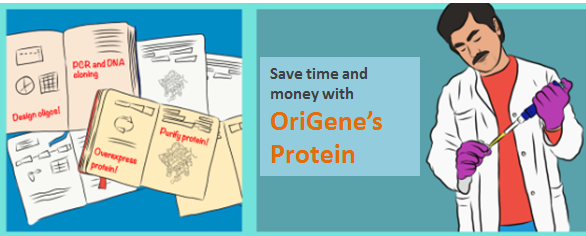
Recently, OriGene conducted a survey in our scientific community on proteins that scientists use in their research. Over 900 scientists responded to the survey worldwide.
Below are some of the questions on the survey:
- Where do you get your proteins?
- How do you find your proteins?
- Which of the followings is the top factor you consider when selecting a protein product?
- What are the downstream applications you use the proteins for?
After analyzing the survey results, we would like to share some insights with you.
1. More and more scientists are choosing to ?buy? proteins from vendors directly.
Based on our survey results, only 42% of scientists are still making proteins in house while 58% of scientists are indicating that they are either ?buying catalog proteins from vendors? or opting for ?custom production through a service company?. This result is consistent with what we are seeing as a general trend in the industry that more are being outsourced and less are being made in house. It is apparent that there are advantages of using outsourced vendors.
- It's convenient. Many vendors already have proteins produced and have them in stock, so only a few clicks away, a protein will be on its way to you. Look for your protein from our 20,000+ catalog proteins.
- It's cost effective. Protein purification often requires high quality DNA, optimized cell conditions and many other downstream materials, which can be costly if researchers only need to purify one protein for an experiment. Scientists at OriGene generate proteins using optimized procedures and produce proteins in large quantities. It is often cheaper to buy proteins than to generate protein in house. Protein from the same lot also has consistent quality.
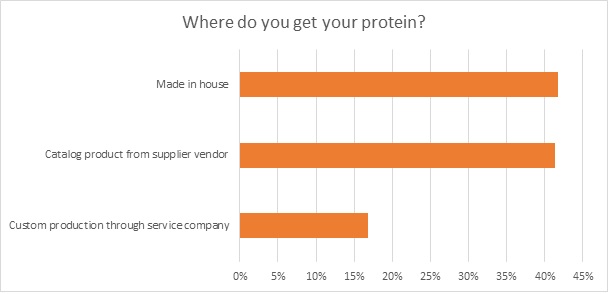
2. Citations, Google searches, and colleague recommendations are still ways for scientists to find their proteins.
Combine together, 86% of scientists who responded to this survey question indicated that citations, Google searches and peer recommendations are still the most popular way of selecting proteins. Having over 20 years of experience serving the science community, OriGene?s products have been cited in over 20,000 papers. If interested, please view our citation list here.
Do you agree with the findings?
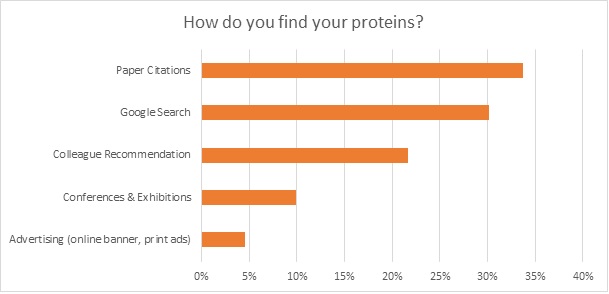
3. Scientists primarily focus on the functional activity of the protein
Almost 50% of scientists choose functional activity of the protein as the major determining factor to choose protein product. Protein function is determined by its structure and modifications. Unlike proteins from natural sources, recombinant proteins are prepared from host cells with different internal environments. These environments may lack features required for proper folding and modifications of the protein. So the question is how do we choose a functional active protein especially when there are no functional data from the vendor?
Generally speaking, there are some factors that can affect the function of the protein.
- Quality of the clone: Proteins made from sequence verified ORF clones will have a guaranteed amino acid (AA) sequence. By modifying the sequence of the clone, protein can be produced with the same sequence as the native protein. It would be best to check the sequence before purchasing a protein to make sure that you have the correct protein.
- Host cells species: Cells from same species tend to produce proteins with close-to-natural structures and post-translational modifications (PTM). Proteins produced from these cells are more likely to be functionally active proteins. For example, OriGene proteins are mostly human proteins made in human cells (HEK293T). Many of these proteins have been proved to be active in both in vitro and in vivo experiments.
- Optimized purification conditions: Strong detergents such as high concentration SDS tend to kill protein activity during purification. When there is no functional data, proteins purified with mild conditions are a better choice for active proteins.
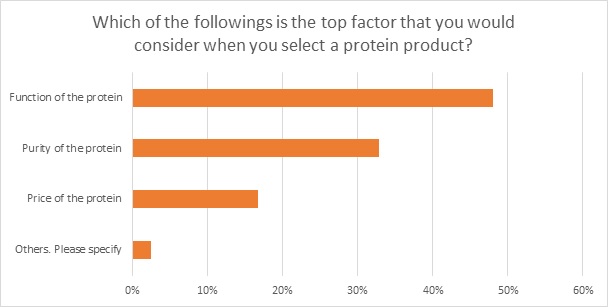
4. What are some of the downstream applications scientists use their recombinant proteins for?
Recombinant proteins are widely used in biological researches. Based on our survey, the number one application of protein is in vitro functional assay. Proteins can also be used to study protein-protein interaction, antibody validation, in vivo animal study and protein microarray. Some applications like functional assays and in vivo study require to know the native structure and function of the protein. Some may only require accuracy of the protein sequence like WB control for antibody validation.
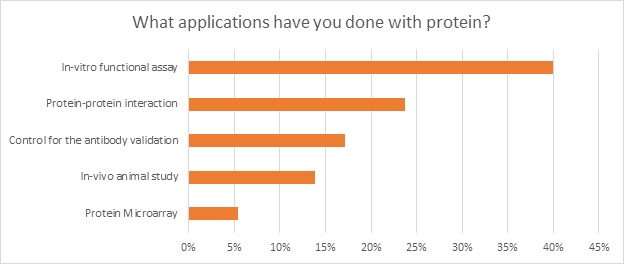
As a premier provider for protein products and services, OriGene offers more than 20,000 recombinant proteins covering more than 60% of human proteome. These proteins are widely used in different applications. Other than our standard proteins, we also have a comprehensive protein service tailored to each scientist?s special need.






























































































































































































































































 Germany
Germany
 Japan
Japan
 United Kingdom
United Kingdom
 China
China